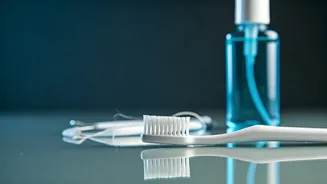The Foundation: Brushing
Brushing your teeth is the first and most fundamental step in oral hygiene, and it lays the foundation for a healthy mouth. It's an activity performed
usually twice a day, using a toothbrush and toothpaste, in order to remove food particles, plaque, and bacteria from the surface of your teeth and along the gumline. To maximize effectiveness, dentists recommend brushing for a minimum of two minutes each time, making sure to reach every tooth. It is also important to use a soft-bristled toothbrush to avoid damaging tooth enamel or irritating the gums. Gentle, circular motions should be used rather than harsh scrubbing to effectively clean the teeth without causing harm. Besides this, the type of toothpaste is also a great factor in proper oral hygiene. Fluoride toothpaste is generally recommended as it helps strengthen the enamel, making the teeth more resistant to decay. Brushing is more than just a routine; it is the cornerstone of a comprehensive oral health strategy.
The Power of Flossing
Flossing plays a crucial role in removing plaque and food particles from areas that a toothbrush can't reach, specifically between teeth and under the gumline. Even with the best brushing technique, these hard-to-access spots remain vulnerable to bacteria buildup. When food debris remains, it feeds bacteria, which generates acids that can erode enamel, leading to cavities and gum disease. Dentists advise flossing at least once daily. To floss correctly, use about 18 inches of floss, winding most of it around your middle fingers, leaving a few inches to work with. Gently guide the floss between each tooth, using a sawing motion, then curve the floss around each tooth, reaching below the gumline. This thorough cleaning helps prevent gum disease (gingivitis and periodontitis) by eliminating the bacterial build-up that triggers inflammation and infection. Consistent flossing also contributes to fresher breath and a healthier overall mouth environment.
Tongue Cleaning Importance
The tongue, often overlooked in oral hygiene routines, is a breeding ground for bacteria, including those responsible for bad breath. Cleaning your tongue helps to remove these bacteria, food particles, and debris, therefore contributing significantly to fresh breath. Tongue cleaning tools, such as scrapers or brushes, are designed to efficiently remove the coating that builds up on the tongue's surface. When you clean your tongue, gently scrape or brush from the back of the tongue toward the front, removing the bacteria and debris. It is best to do this after brushing your teeth. This routine will not only refresh your breath but also enhance your taste perception. Moreover, a cleaner tongue contributes to a healthier overall oral environment by reducing the bacterial load. Adding tongue cleaning to your daily routine can make a noticeable difference in your breath's freshness and your overall oral hygiene.
Rinse After Meals
Rinsing your mouth after meals is a simple yet effective habit for maintaining oral hygiene. The primary benefit of rinsing is removing food particles and acids that remain after eating. These substances can promote bacterial growth and contribute to the formation of plaque, which can lead to tooth decay and gum disease. By rinsing with water, you can neutralize acids and reduce the time bacteria have to feed on food remnants. Rinsing also helps to freshen breath and can improve the overall feeling in your mouth, which encourages good oral health. It is particularly beneficial after consuming sugary or acidic foods and drinks. Though rinsing should not replace brushing and flossing, it offers an easy, accessible way to contribute to a healthy mouth. It is recommended to rinse with water, or an antimicrobial mouthwash, to boost its effect.
Oil Pulling Benefits
Oil pulling, a traditional practice rooted in Ayurvedic medicine, is a method of rinsing the mouth with oil to improve oral hygiene. The most commonly used oil is sesame or coconut oil. The process involves swishing a tablespoon of oil around the mouth for about 15-20 minutes daily, ideally on an empty stomach. During the swishing process, the oil is believed to help remove bacteria, toxins, and plaque from the mouth. The oil's properties can bind to these substances, which are then discarded when the oil is spat out. Oil pulling is thought to contribute to several oral health benefits, including reducing bad breath, decreasing plaque, and improving gum health. Although more research is needed to fully understand the effects of oil pulling, it can serve as a supplementary practice to your usual oral hygiene routine. After oil pulling, it is essential to spit the oil into the trash can to avoid clogging drains, and rinsing the mouth with water.













